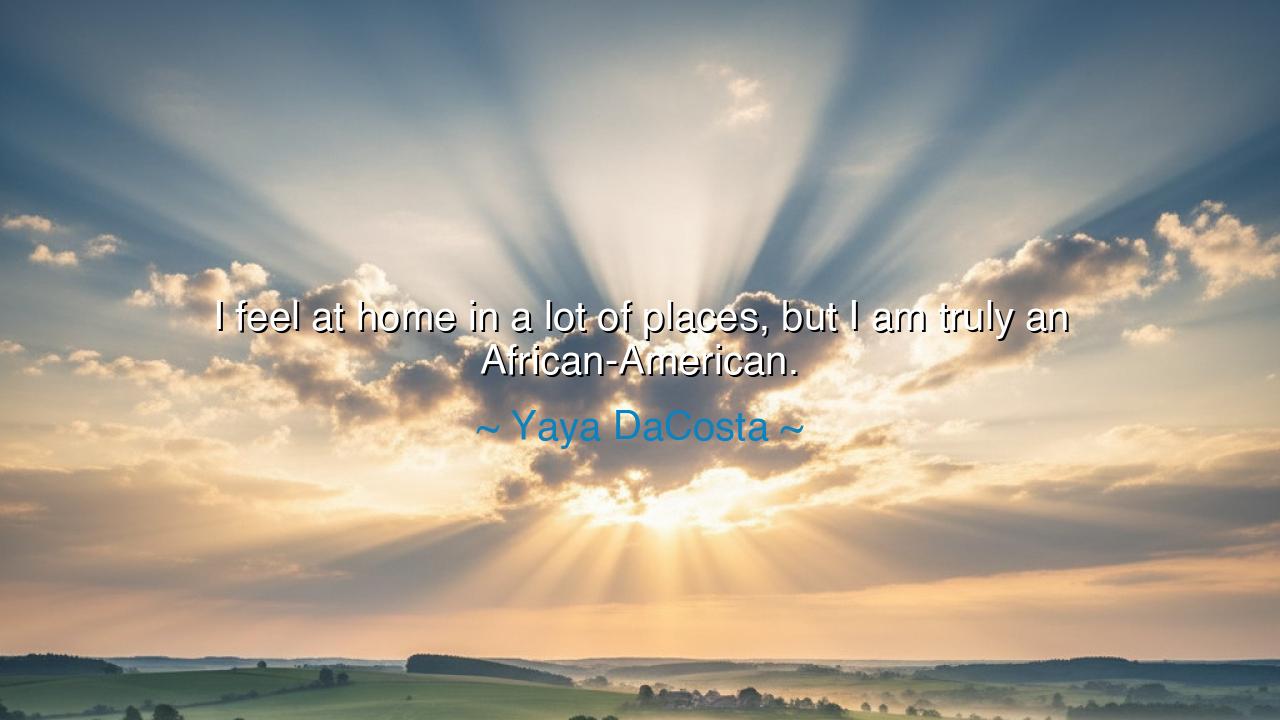
I feel at home in a lot of places, but I am truly an






In the clear-voiced declaration of Yaya DaCosta—“I feel at home in a lot of places, but I am truly an African-American”—we hear the old music of belonging and the hyphen’s brave bridge. The sentence holds two candles: one for the wide world in which a soul can feel at home, and one for the root that names who she truly is. The first honors hospitality; the second safeguards identity. Together they form a compass by which a traveler can cross oceans without losing the shoreline of her people.
The ancients would have understood this double vow. A wise person keeps many thresholds yet only one hearth. To “feel at home in a lot of places” is to carry an inner house made of language, memory, and manners that adapt without surrender. But the heart must still be anchored. To say “I am truly an African-American” is to bind oneself to a history that crosses centuries—the drum and the hymn, the field and the factory, the riverboat and the railroad, the sermon and the step—so that choice and chance alike are braided to inheritance.
Consider the long road of the African-American story. Stolen from homelands, forced into bondage, emancipated without shelter, migrating by millions from cotton to steel, from Delta dusk to Harlem dawn—the people learned to “feel at home” wherever the door cracked even slightly: in church basements that birthed freedom songs; on corner stoops that governed block-by-block mercy; in beauty salons and barbershops that became parliaments of laughter and law. Yet through every address change, the name endured. The hyphen did not divide; it stitched: African memory to American struggle, ancestral cadence to civic promise.
A single life makes this lesson plain. Zora Neale Hurston, wandering scholar and storyteller, felt at ease in many places—New York salons, Florida porches, Bahamian docks. She welcomed the world with wide arms, yet never unlaced her center. Her sentences carried the sap of Eatonville; her folklore held the courage of those who sang under iron weather. Hurston’s “many rooms” of comfort did not dilute her; they displayed her. So with DaCosta: multiplicity of dwelling, singularity of self.
There is a quieter parable from the Great Migration: a family leaving Mississippi night by train, arriving to a Chicago morning of soot and possibility. They learned to buy bread on credit, to dodge winter with coal, to spell their names through a factory whistle. In time, they could say they felt at home in the neighborhood’s grid of alleys and stoops. But at the kitchen table, over collards and cornbread, they taught their children the names of grandparents buried in red clay, the meanings of songs older than the city. The children grew fluent in both directions—American asphalt and African echo—truly themselves because they refused to choose against either truth.
From this saying, gather a teaching for any soul scattered by study, work, or wandering: hold fast to the root while you bless the road. Let hospitality enlarge you; let heritage define you. Do not fear the many rooms of the world; fear only the room that asks you to misname yourself. The hyphen is not a wound; it is a weld. It allows you to honor every place you inhabit without unthreading the banner of who you are.
Take these practical steps. (1) Build an altar of memory: keep a living archive—photos, recipes, proverbs, songs—that names your African-American lineage, and share it with the young. (2) Wherever you dwell, join one house of community—church, mutual-aid circle, arts collective—so your “feeling at home” has neighbors and responsibilities. (3) Learn the local soil—its history, its hurts, its heroes—and contribute a craft or kindness that carries your people’s excellence into public good. (4) Speak your name in full—African-American—in rooms that prefer shorthand; correct gently, persistently, so that hospitality never becomes erasure.
At last, keep this counsel like a seal upon the heart: the world is many-roofed, but your truth is one hearth. Be gracious to the places that welcome you; be steadfast to the people who made you. Then your life will read as DaCosta’s sentence sings: widely at home, deeply African-American, and truly yourself—bearing the old fire into new rooms without letting the wind take it.






AAdministratorAdministrator
Welcome, honored guests. Please leave a comment, we will respond soon